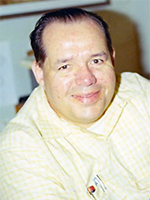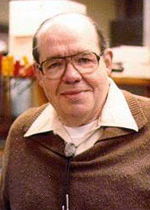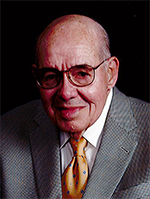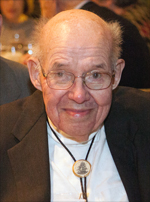Jonathan W. Amy
Jonathon W. Amy was born March 3, 1923 and grew up in Delaware, Ohio where his father was Head of the English Department at Ohio Wesleyan University. He grew up in a house filled with books some inscribed by visiting authors and acquired a love of reading.
Jon Amy's education at Ohio Wesleyan was interrupted by World War II, during which he served as a communication officer in the U.S. Maritime Service. He spent the war years in the Mediterranean and the Far East acquiring a taste for sailing and a passion for electronics and problem solving.
Following the war, he returned to Delaware, where he married Ruthanna Borden and completed a Bachelor of Arts degree from OWU. In the fall of 1948, the young family (later to include three children Bur, Jim and Terri) moved their house trailer to Purdue to start graduate studies in chemistry, Amy was assigned a teaching assistantship in physical chemistry, working with Professor Hunt. His electronic and mechanical skills were used building experimental lab equipment.
Jonathan Amy completed a Master of Science degree with Professor Thomas DeVries in 1950. On the suggestion of Prof. Guy Mellon he stayed at Purdue and completed his Ph.D. in 1955 working on spectroscopy with Walter Edgell, a young professor of physical chemistry.
His Ph.D. project involved building a microwave spectrometer, a new technique based on developments in military radar. The radiation lab at MIT produced a multivolume set describing the results and details of this research. Many parts were available in surplus stores. Two instruments had been built in the U.S., one at Westinghouse Research in Pittsburgh, and one at Duke University.
Gas-phase frequency resonance measurements produced data that could be used to determine bond length and angles in simple molecules as well as low-level quantitative measurements. Other spectroscopic techniques were added to Edgell's laboratory. These required new instrumentation and Jon Amy developed special relationships with instrument manufacturers to specify instrumental performance, evaluate prototypes, and make modifications. Many of these business relationships turned into friendships that have lasted a lifetime.
He stayed at Purdue to plat a sub-division, set up a saw mill and build his home and to direct the Department of Chemistry’s Instrumentation Facility, later named the Jonathan W. Amy Facility for Chemical Instrumentation. This entity was formally created in the mid-1950s with a mission of fusing science and technology through collaboration and creation.
The Industrial Associates Program, originated within Chemistry in the 1980s, before the Bayh-Dole Act, and provided a way of involving students with industry and for industrial representatives to spend time at Purdue.
Prof. Jonathan Amy’s towering achievement was the conception and implementation of a unique vision for research in the chemical sciences involving a partnership between faculty, graduate students and a professional instrumentation staff that has made indelible contributions to research, to industry and to faculty careers at Purdue over the past 50 years. This model, implemented as the Jonathan W. Amy Facility for Chemical Instrumentation, has been widely admired nationally.
Prof. Amy has worked with manufacturers such as Fisher, Aerograph, Varian, Hewlett-Packard, Finnigan, Perkin-Elmer, Galileo, IBM, and Thermo in perfecting instrumentation. He has made important contributions to mass spectrometry, electron spectroscopy, chromatography, and nuclear magnetic resonance. He has been a problem solver par excellence, whether the problem was one of local fire service or the future direction of scientific research in the U.S.
Prof. Amy has been recognized by the American Chemical Society through its Chemical Instrumentation Award, by the Chemistry Department with the Wetherill Medal and the Amy-Mellon Lectureship, by Purdue University with an Honorary Doctor of Science degree in May 2014, as well as locally through the George Award for outstanding service to the community.
His pithy wisdom included items like “Tackle the problem, not the symptom” and “There is always time to do a job twice, but never enough to do it properly.” Jon spoke often of his mission: to help people solve problems.
He died on December 4, 2016, three days after attending the Amy Mellon Lecture and celebrating this event with a dinner in his home with members of the Chemistry Department.
Listen to Dr. Amy's 2010 oral history interview in the Purdue Archives and Special Collections:
Part one
Part two



